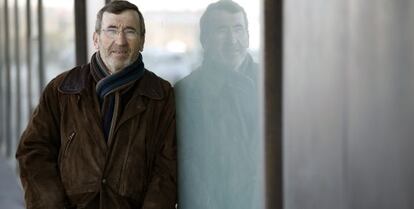“Things got so bad that I thought about putting a bullet through my head”
The fallout from March 11 ended up destroying the police chief's career and leaving him a widower

On March 11, 2004, Rodolfo Ruiz was the commissioner at a police station in Vallecas, a working-class district in the southeast of Madrid. One of the bombs that exploded that day went off at the Pozo del Tío Raimundo station, part of his precinct.
Speaking a decade later, he is still clearly affected by what he saw that day: “Bodies lying twisted among the mass of burnt metal, and the sound of those people’s cellphones ringing.”
His experiences still haunt him, but tragedy of a personal nature was to unfold in the following months that would destroy his career and leave him a widower.
When he arrived, officers from the police’s TEDAX bomb unit were already at the scene, says Ruiz. “That morning TEDAX officers told me that the explosives were not of the same kind ETA used. I gave instructions for everything to be bagged, all the personal belongings of the victims – clothes, shoes, anything that might help with the investigation. Then an investigating magistrate arrived, who issued instructions that the bags be taken to the station house. But what happened was that when the officers got to there, the TEDAX team said that they had been told to take all the evidence to the IFEMA trade fair site that was being used as a mortuary for the victims. And that is what happened. When I saw the investigating magistrate, she told me that this shouldn’t have happened, and that the bags would have to be taken back to the station house in Vallecas.
I was even called a murderer on the radio. They accused me of interfering with the backpack"
“But the bags were already at IFEMA, so I ordered the officers to bring them back to the station house, where we had created a secure, locked area, meaning that they would have been in police custody the whole time. A group of officers then began an inventory. Around 11 that night I went home, exhausted,” he says. Around two hours later, he was woken by one of his officers, who told him that among the possessions a backpack had been found containing a bomb.
Ruiz immediately headed for the station house, by which time the bomb had been deactivated. It would provide key information that would lead to the Islamist extremists responsible for the attacks a month later, but who would then blow themselves up when the apartment they were holed up in was surrounded by police.
Despite mounting evidence to the contrary, the government of Prime Minister José María Aznar insisted for two days that the attacks were the work of ETA. This conspiracy theory was taken up by some in the media. They seized on the backpack as proof that the police had manipulated the evidence. What’s more, Ruiz appeared to have links to the Socialist Party, which had won the general elections, making him the perfect potential scapegoat. Over the following months he would be attacked constantly in sections of the media, and then found himself in court accused of illegally arresting two Popular Party local officials who had attempted to assault the then-defense minister, the Socialist Party’s José Bono. He was later acquitted.
“I was even called a murderer on one radio station. They accused me of interfering with the backpack. The whole thing was ridiculous. I brought charges against them for defamation, but nothing ever happened. Of course everybody forgets that at the time of the attacks, and when I would supposedly have interfered with the evidence, the Popular Party was in office. It was absurd, but eventually, it began to get to my family. My son was insulted at school, while the neighbors would ask my wife if what they were saying on the radio was true, and then there was the Bono incident, and the trial…”
His wife and daughter began suffering from depression. His child recovered, but his wife committed suicide while under treatment in a clinic.
The death of his wife and his daughter’s depression, coupled with the continuous pressure from certain sections of the media, took its toll on Ruiz. He had also been removed from duty while awaiting the outcome of his appeal to the Supreme Court over the so-called Bono case: “Things got so bad that I thought about putting a bullet through my head, but my colleagues at work had taken my pistol away.”
Following the trial in 2007 and the convictions handed down to 21 men for their involvement in the Atocha bombings, Ruiz took early retirement and moved to Zaragoza, and is slowly closing the door on the terrible events of a decade ago, and the nightmare that followed.
Tu suscripción se está usando en otro dispositivo
¿Quieres añadir otro usuario a tu suscripción?
Si continúas leyendo en este dispositivo, no se podrá leer en el otro.
FlechaTu suscripción se está usando en otro dispositivo y solo puedes acceder a EL PAÍS desde un dispositivo a la vez.
Si quieres compartir tu cuenta, cambia tu suscripción a la modalidad Premium, así podrás añadir otro usuario. Cada uno accederá con su propia cuenta de email, lo que os permitirá personalizar vuestra experiencia en EL PAÍS.
¿Tienes una suscripción de empresa? Accede aquí para contratar más cuentas.
En el caso de no saber quién está usando tu cuenta, te recomendamos cambiar tu contraseña aquí.
Si decides continuar compartiendo tu cuenta, este mensaje se mostrará en tu dispositivo y en el de la otra persona que está usando tu cuenta de forma indefinida, afectando a tu experiencia de lectura. Puedes consultar aquí los términos y condiciones de la suscripción digital.








































